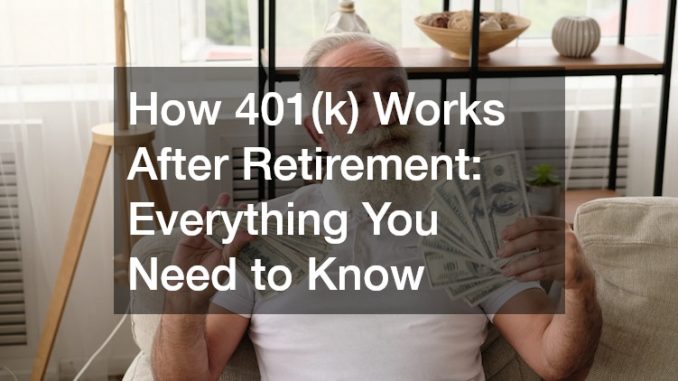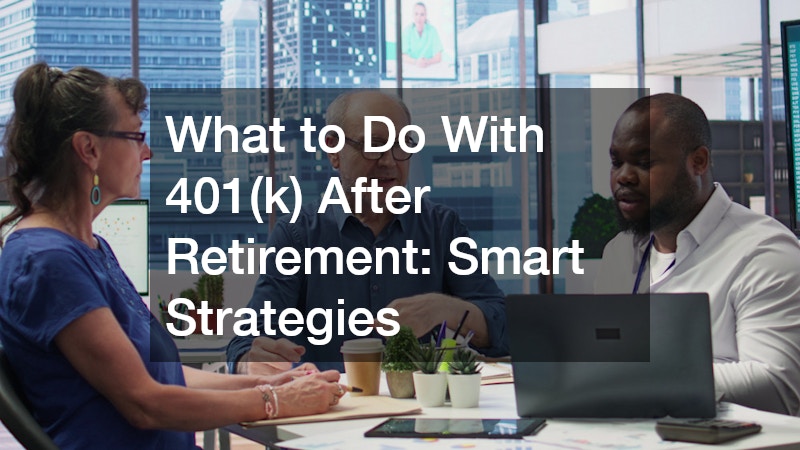

When retirement finally arrives, many people wonder what happens to their 401(k). This tax-advantaged retirement savings account was likely one of your main tools for building a nest egg during your working years. But what happens to it now that the regular paychecks have stopped?
Whether you’re already retired or planning ahead, understanding how a 401(k) works after retirement is key to making the most of your savings. This guide will walk you through the rules, options, and smart strategies to manage your 401(k) and help you avoid common pitfalls.
What Happens to Your 401(k) After Retirement?
Once you retire, your 401(k) doesn’t disappear—it remains your money, and it continues to be invested unless you choose otherwise. But your relationship with your 401(k) changes significantly. Instead of contributions, your focus shifts to withdrawals, taxes, and asset management.
Here’s what you need to know:
- You’re not required to cash out immediately. You can leave your money in the plan if your balance is $5,000 or more.
- It continues to grow—your investments stay active unless you move or liquidate them.
- You gain control over when and how much to withdraw, though Required Minimum Distributions (RMDs) will eventually apply.
Understanding your options helps avoid tax mistakes and ensures a steady stream of income.
When Do You Have to Start Taking Money Out?

One of the biggest concerns retirees have is when to begin withdrawing from their 401(k). While you can start taking money out at age 59½ without early withdrawal penalties, you don’t have to begin withdrawals right away.
But at age 73 (as of 2023), the IRS requires you to start taking Required Minimum Distributions (RMDs). If you don’t comply, you could face hefty penalties—up to 25% of the amount that should have been withdrawn.
Key points to remember:
- RMDs are based on your account balance and IRS life expectancy tables.
- You must take your first RMD by April 1 of the year after you turn 73.
- Each year’s RMD is due by December 31.
Failing to plan for RMDs can lead to tax shocks and depleted funds, so it’s important to prepare ahead.
Should You Keep Your 401(k) or Roll It Over?
After retirement, many people ask: Should I leave my money in the 401(k) or roll it over into an IRA? The answer depends on your goals, plan features, and investment options.
Reasons to keep your 401(k):
- Access to institutional-grade investment funds with low fees.
- Strong protection against creditors under federal law.
- Penalty-free withdrawals if you retire at age 55 or older.
Reasons to roll over to an IRA:
- More control over investment choices.
- Simplified management if you have multiple retirement accounts.
- Easier access to partial withdrawals and better beneficiary options.
No matter which route you choose, make sure it aligns with your retirement goals, estate plans, and risk tolerance.
How Are 401(k) Withdrawals Taxed?
Taxes are a crucial factor in post-retirement planning. Since 401(k) contributions were made pre-tax, withdrawals are considered taxable income.
Here’s what to expect:
- Withdrawals are taxed as ordinary income at your federal and possibly state tax rates.
- No FICA taxes apply, but the added income could impact Medicare premiums.
- Roth 401(k) withdrawals (if applicable) are tax-free if the account is at least 5 years old and you’re over 59½.
A smart withdrawal strategy—such as withdrawing just enough to stay in a lower tax bracket—can help stretch your savings further.
What to Do With 401(k) After Retirement: Smart Strategies

Knowing what to do with a 401(k) after retirement means developing a plan that balances income, taxes, and longevity. Here are some smart moves to consider:
- Create a sustainable withdrawal plan (like the 4% rule or a dynamic strategy).
- Delay Social Security to increase lifetime benefits while drawing from your 401(k).
- Convert portions to a Roth IRA during low-income years to reduce future tax burdens.
- Consolidate old 401(k)s into one IRA or plan for easier tracking and RMDs.
- Work with a financial advisor to personalize your plan and adjust it annually.
Good planning today helps secure income tomorrow, reduces tax liabilities, and avoids emotional decision-making in later years.
How 401(k) Works After Retirement: Key Takeaways
Retirement is not the end of your 401(k)’s journey—it’s the beginning of a new phase. Your account remains a vital tool for income, investing, and even legacy planning.
To recap:
- You can leave your 401(k) where it is, roll it into an IRA, or begin withdrawals.
- RMDs kick in at age 73, and missing them can cost you.
- Withdrawals are taxable, so timing and strategy matter.
- A personalized withdrawal and rollover plan can make a big difference in how long your savings last.
With the right planning, your 401(k) can continue supporting you well into your golden years.